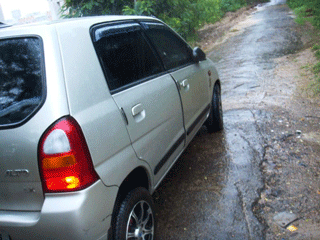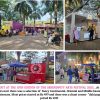Goa is abuzz with excitement as vintage bike and car owners, users, collectors and fans are decking […]

MENACING DARK GLASS CAR WINDOWS! BY ADV PUNDALIK N RAIKAR
In the News, Oct 02- Oct 08, 2021 October 1, 2021Who are these people who need privacy behind dark tinted glasses in their posh cars… celebrities, criminals, may be even police and politicians? It is illegal to hide behind dark glass windows of four-wheelers in public. Just about everybody gets away with it, few are punished, says Adv Pundalik Raikar.
By Adv Pundalik N Raikar
Celebrities and criminals love dark car windows although they are illegal no matter how fancy your four-wheeler. All kinds of people highbrow and low brow desire the privacy of dark or tinted windows in public spaces…which is not good news most of the time!
GOA is otherwise a peaceful place to live in! It is this peace-loving nature of Goans that attracts many people to this state. Of late quite a few people have made this tiny state on the west coast of India as their permanent home. Goa has seen its own share of criminal activities.
But in recent times there has been a rise in crime, especially in the number of shoot-outs and murders. This is because Goa has become a tourist destination attracting other categories of people along with bona fide tourists seeking a peaceful holiday on the sunny beaches or reclusive holiday resorts.
In the early 70s it was the hippies who visited Goan villages looking for a purely existential experience and peace on earth. It is widely perceived that recreation drugs came along with this first hippies seeking nirvana in Goa. But the hippies only dealt with soft drugs like marijuana for their highs into blissfulness.
The hard plethora of drugs came much later when the Nigerians got into the trade of drug-peddling for a living. This is of more recent origin and has now become a mega business with all kinds of big-time criminals operating behind the scenes the world over. What we commonly see is that many Nigerians are every now and again and caught with assorted caches of drugs and charged under the Narcotics Act but they are soon out on anticipatory or regular bail from the courts in Panaji.
ILLEGAL TRADE
GOA is infested with illegal sale of drugs, child prostitution, child sex abuse and in the past several hard core criminals have been apprehended within Goa. Lately the crime rate has zoomed and we are witnessing the gangster war times which prevailed in 80’s and 90’s — criminals are beginning to find a safe haven in Goa anew.
Although criminal activities are on the rise the government of the day has not been able to do anything much to curb it. It is public knowledge that the state government has not been able to tackle the crime rate and put a firm full stop to the purveying of drugs and its accompanying tragedies. Goa has already earned the dubious distinction of being the sex capital of India where tourists are attracted for all the wrong reasons.
One of the things which has been noticed is that the vehicles of many criminals are used and these vehicles enjoy tinted pitch black windows. This enables many sins to be committed in the recesses of a darkened vehicle and of course, once the evil is done it is easy for the criminals to get away without drawing much attention.
HIGH DENSITY OF CARS
THIS is to point out that for some reason (third-rate and expensive public transportation) poor little rich Goa has one of the highest density in car population in India. And many of these four-wheelers have tinted glass windows which are sometimes pitch black. Such black filmed car windows are absolutely not permissible and even illegal, but the law enforcement machinery in Goa take a very lax attitude towards this. It is no wonder that increasingly we are seeing more and more dark tinted secretive cars on the roads of Goa.
You will see these exclusively and expansively protected cars outside police stations at Panaji, Margao, and within court jurisdiction in broad day light. Police officers including the SHO’s of the town police as well as the Traffic Cell turn a blind eye to this blatant illegality which can often spell out grave danger to someone’s life.
FINES GALORE!
SEVERAL lakh rupees are collected every year from the general public via ordinary simple fines for traffic and motor vehicle violations such as not wearing helmet, not fastening seat belt, insurance violation and so on. But the illegalities pertaining to tinted and pitch dark car windows are far more serious as they may be a threat to the safety and security of an entire society. Unfortunately, this is conveniently overlooked or totally ignored by our law enforcement authorities.
These oftentimes eye-catching vehicles with tinted or black pitch glass windows are often registered in states other than Goa, they have name plates of our neighboring states of Maharashtra, Karnataka, Gujarat and further apart, and their cars ply happily up and down Goan highways, roads and narrow lanes with impunity. Worried locals of course notice the dark glass windows and wonder if some film shooting is going on and if Amitabh Bachchan or Rekha are in town.
Like it or not it is a serious issue as it is quite possible that such vehicles could be engaged in human and child trafficking in and out Goa. Dark glass windows make it very obstructive and easy and shielded from any questioning public gaze.
SECURITY RISK
THE cars are likely to be a huge security risk to the life of the good citizens of Goa. Rule 100(2) of the Motor Vehicle Rules, 1989 says that the glass of windscreens and rear windows of every motor vehicle should be such that they are maintained in a condition permitting VLT (Visual Light Transmission) and this should be not less 70%. On side windows it should not be less than 50%. They should conform to Indian Standards (IS: 2553- Part 2 – 1992).
The said IS, under Clause 5.1.7, deals with VLT standards and it provides for the same percentage of VLT through the safety glass, as referred to in Rule 100(2) itself. There have also been a series of rulings by various High Courts as well as the Supreme Court of India on Rule 100 (2) of the Motor Vehicles Rules, 1989. The landmark judgment on the issue of tinted glasses on motor vehicles has been in the case of Avishek Goenka vs the Union of India and (2012) 5SCC 321.
In the judgment of Avishek Goenka the SC of India has held as under in Para 1:
“Alarming rise in heinous crimes like Kidnapping, Sexual assault on women and dacoity have impugned upon the right to life and the right to live in a safe environment which are within the contours of Article 21 of the Constitution of India. One of the contributory factors to such increase is use of black films on windows/windshields of four whelled vehicles. …..”
Again, in para 3 we have: “The use of black films upon the vehicles gives immunity to the violators in committing a crime and is used as a tool of criminality, considerably increasing criminal activities. At times, heinous crimes like dacoity, rape, murder and even terrorist acts are committed in or with the aid of vehicles having black films pasted on the side windows and on the screens of the vehicles. It is stated that because of non-observance of the norms regulations and guidelines relating to the specifications for the front and rear windscreens and the side windows of the vehicles, the offenders can move undetected in such vehicles and commit crimes without hesitation.”
In para 5: “The use of black films also prevent the traffic police from seeing the activity in the car and communicating with the driver of the vehicle”
In Para 7:“The court can take judicial notice of the fact that even as per the reports maximum crimes are committed in such vehicles and there has been definite rise in the commission of heinous crimes, posing a threat to the security of individuals and the state, both”
In para 8: Whatever are the rights of an individual they are regulated and controlled by the statutory provisions of the act and the rules framed thereunder. The citizens at large have a right to life i.e. to live with dignity, freedom and safety. This emerges from Article 21 of the Constitution of India. As opposed to this constitutional mandate, a trivial individual protection or inconvenience, “if any must yield in favour of the larger public good”
In para 36: In the light of the above discussion, we have no hesitation in holding that use of black films or any other material upon safety glass, windscreen and side windows is impermissible. In terms of Rule 100 (2), 70% and 50% VLT standard relate to the manufacture of these safety glass for windshields (front and rear) and side windows, respectively. Use of black or colored films or any other material on windscreens and side windows is impermissible in law. It is VLT of the safety glass without any additional material being pasted upon the safety glasses which must conform to legal specification, or the owner of defaulting vehicles hauled up for severe fining and prosecution in court.
Para 40: For the reasons afore stated, we prohibit the use of black films of VLT percentage or any other material upon the safety glasses, windscreens (front and rear) and side glasses of all vehicles throughout the country. The Home Secretary, Director General of Police /Commissioner of Police of the respective states/Centre shall ensure compliance with this direction. The directions contained in this judgment shall become operative and enforceable with effect from 4/5/2012.
Again, to quote from para 41:“With the above directions, we partially allow this writ petition and prohibit the use of black films of any percentage VLT upon the safety glasses, windscreens (front and rear) and side glasses“. In many state High Courts, the recent one being the judgment of Madras High Court, have also passed similar judgments directing the state and its law enforcement machinery to act against these grave violations.
However, even after nine years of the passing of the Avishek Goanka’s judgment, the law has not been implemented in the state of Goa. The state government is seen to be more inclined to protect law breakers rather than the law abiders. Today, in Goa, it pays to violate the law rather than to obey it.
WEAK LAW ENFORCERS
IRONICALLY, most of these violations are seen to be done by supporters of the government than any member who is opposed to the government! In effect it is clear that the government of the day supports the illegalities and this has been in contempt of the judgment of the Supreme Court in Avishek Goenka’s case.
The DGP and the Home Secretary have shown themselves to be very weak law enforcing officers and the government of Goa a very weak government unable to enforce the Judgment of the Hon’ble Supreme Court of India and thus, playing into the hands of criminals and antisocial elements.















